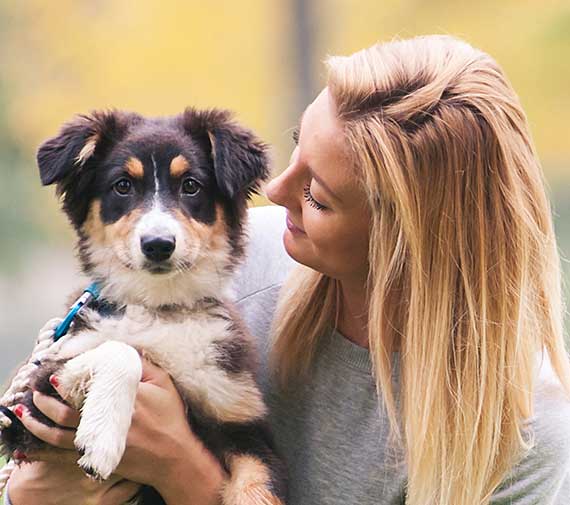
Is Dog Vaccination Beneficial or Harmful?
We've all seen the yard signs and window stickers from alarm companies. They tell potential burglars that the owners of this house take crime prevention seriously and have taken the time and made an investment in protecting their property.
With the door sensors, motion sensors and smoke detectors they have taken steps to, in effect, immunize their property from potential disaster. This affords them the peace-of-mind that comes with preventing problems before they start and knowing that if they do start that the damage can be mitigated.
The same is true for dog vaccination—or is it?

Do you know your dog's vaccination schedule?
Let reason and evidence guide the administration of dog vaccine
Vaccines have been in the news lately because even though they have proven their benefit and helped to all but eradicate many diseases in humans, which were scourges in bygone eras (like small pox and polio), some have jumped on the anti-science bandwagon and refused to have their children immunized. This has, of course, led to the resurgence of diseases like measles in school children.
However, since vaccines are not 100% free of risks we don't want to advocate pumping children, adults or our pets full of chemical cocktails naively believing there are never any consequences. There needs to be a bit of balance and recognition of the important role dog vaccine plays in the health of our pets while also recognizing the need to administer them in a responsible way.
So, let's familiarize ourselves with the basics:
- What is a dog vaccine?
- Should I give my dog vaccines?
- How often should dog vaccinations be administered?
Dog Vaccine 101
Most of us are familiar with the idea of vaccines. We introduce antigens that stimulate the immune response effectively "teaching" the body how to recognize the virus enabling it to mount an attack against the actual intruder should it occur. Levels of antibodies for that disease rise in the bloodstream shortly after vaccination and the cells "remember" how to build more antibodies if there is exposure to the disease in the future.
The immune system needs to be "trained" for each disease it may face. That is why you have to get a dog vaccine for each disease. The core diseases dogs are vaccinated for are rabies, parvovirus, distemper and canine hepatitis. Depending on the area you live in or where you plan on traveling you may need to get your dog vaccines for other diseases.
Do you really need to give your dog vaccines to keep them safe?
Some may reason that since certain diseases are now relatively rare that there is no longer a need to provide their dog vaccinations. At some level it makes sense. If there are few cases of rabies anymore why subject my dog to the risks associated with giving a dog vaccine in the first place?
The thing to remember is that the reason rates of infection have been driven so low are because of the vaccines. Elimination of vaccines might work at the beginning for a few people but as more and more dogs are left vulnerable, more and more cases will arise. Where many dog owners have decided to not vaccinate their dogs you would find larger and larger outbreaks occurring.
This is still the case in some countries where dog vaccination rates are low. Dogs become infected and in turn the people bitten by those dogs infected with rabies results in unnecessary deaths for both. Dog vaccines are meant as a preventive measure. Of course, without the vaccination nothing is prevented and disease is free to roam among the unprotected population.
If dog vaccine is beneficial how often should it be administered?
As with so many things, if some is good, more is not necessarily better. Vaccinations for dogs are not without risks. When the vaccine is introduced the immune system is stimulated as it thinks it is fighting an actual intruder. Some dogs can have allergic reactions and in some cases there can be an immune mediated disease that develops causing the immune system to turn on it's own body.
While these reactions are relatively rare, they are not non-existent so there is a need to administer dog vaccines responsibly. After your dog has received a vaccination you will want to monitor them for symptoms of a bad reaction that can include:
- Lethargy
- Loss of appetite
- Vomiting
- Diarrhea
- Injection site pain/swelling
- Facial swelling/hives
- Fever
- Problems breathing
- Difficulty walking
- Collapse
- Seizures
Of course, if your dog is exhibiting any signs of a reaction to the vaccine—call your vet.
Should I follow my vet's advise about puppy vaccinations?
Some have raised the objection that vaccinations are just a money-grab for veterinarians who are, after all, running a business. A red flag might be a vet that is pushing to administer more than the recommended schedule of shots. But most vets, first and foremost, are concerned with the well-being of their patients and there is no long-term business advantage to over-vaccinating and damaging their reputation.
Basically, for puppies (who get some antibodies from their mother's milk) current recommendations are for a series of three puppy vaccinations three to four weeks apart starting at six to eight weeks. The final puppy vaccination would be done at 16 weeks. If you are getting a puppy from a breeder you can have a titer test done to test for antibodies to make sure they were given the appropriate vaccinations. Your vet can also use titer tests to gauge antibody levels for older dogs who will generally receive booster shots every three years.
On the other hand, while there are potential risks it would be a mistake to avoid giving your dog vaccinations at all. Some vaccinations are required by law. Which ones can vary by state or province so check which ones are required and consult with your vet about others that may be recommended where you live or plan to travel.
Get the dog vaccinations you need when you need to get them
Long-story-short, the best thing you can do for your puppy is to get them the initial vaccinations at the right time according to the schedule. After that, dog vaccine should be administered about every three years. Be sure to discuss with your vet any additional vaccinations they might need beyond those in the core set that are specific to your area.
For example, if you live in a wooded area with ticks a vaccine for Lyme disease would be advisable. Is your dog in frequent contact with other dogs or going to be boarded? A vaccine for bordetella (kennel cough) might be a good idea.
Going forward you will want to know the dog vaccine schedule and which diseases you need to provide protection for. Stick to your annual check-ups and work with your vet using best practices and tools like titer tests to inform your decisions.
Like the homeowner with a security system you will have the peace-of-mind knowing you've given your Aussie the best chance at preventing a serious disease from unnecessarily doing them harm.
Have Dog Training Questions?
Check out these introductory dog training videos...
I want my dog to stop being aggressive.
I want some help training my new puppy.
I want my dog to stop barking at everything.
Get Australian Shepherd Info, Website Updates, Special Offers, and Cartoons...
FREE GIFT
You'll also receive a free copy of the ebook
My Everyday Dog Training Tools
by professional dog trainer Daniel Abdelnoor, "Doggy Dan"










 Loading Image...
Loading Image...